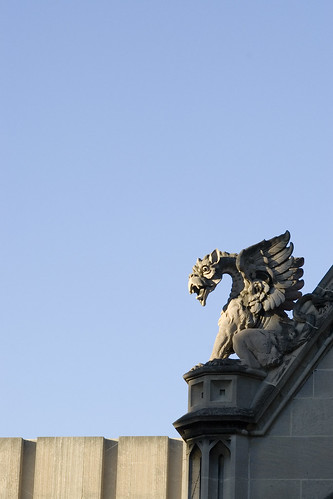Kvelling over the University of Chicago

To be sure, all unrestrained shows of hyperbole are destined to be corrected by reality and winter, so I figure I'd better get it all out of my system now. Here, uncensored, my kvell.
First, there's Chicago as a wellspring of imagination, ideas, and intellectual activity, particularly for the digital humanities. Given free rein to explore, I'm hunting out the most interdisciplinary and experimental faculty at the university and interviewing them. Scott Branting, archaeologist at the Oriental Institute, is using GIS and medical modeling to develop pedestrian traffic maps of ancient Iron-Age cities. With nothing but corpses, a street grid, and the topography of a city, he can extrapolate a pretty remarkable prediction of where traffic flows (he tried it out on Cambridge, UK first. it predicts where the good coffee shops are.). Elisabeth Long, a librarian, has been experimenting with scans of medieval manuscripts so close that one can nearly conduct paint and orthography analysis virtually. Next on my list is John Padgett, a political scientist, who plugged in 60,000 renaissance Florentines and conducted network analysis on them. Conversations start with the particular and expand to the digital future of the humanities, the nature of the landscape in history, the possibilities for the teaching profession in dialogue with the public.
Second, there's Chicago as a radical opportunity to experience America. At a time when red state and blue have polarized the nation, finding liberals who can talk to middle America is rare. In the coastal universities, it is very rare indeed. Earnest Chicago, politically split between a free-market tradition of economic analysis and a deeply interventionist mode of sociological analysis, finds libertarians and hippies in conversation, strange intersections, and actual exchange. Last night at the Regenstein Library, a sign on the stairwell: "Got prayer? room 207." I stopped by to find a single librarian praying over a list of several dozen distressed undergraduates, name by name, spending a good five minutes on each concern over MCAT's and roommates and calling, lifting them up for guidance and company and love in whatever way. I stayed there and listened, genuinely moved by the practice. University towns often miss this kind of emergent American tradition; in Berkeley, the evangelicals kept to themselves, a little reclusive, perhaps suspicious of faculty accustomed to prognosticate their annihilation before modernity. Chicago has philosophers, economists, and historians willing to talk about American faith, its meaning, and their experiences, exploring both the conservative and progressive forms of religious practice.
In Eden the fruit falls from the tree without labor. In Chicago, one works hard, but the ideas are so abundant as to spring forth from the ground uncoaxed, spontaneous, and delightful. Bring it on, winter.










0 Comments:
Post a Comment
<< Home